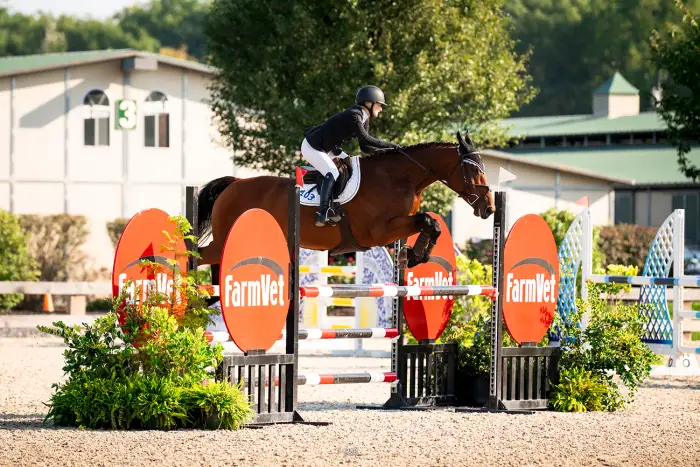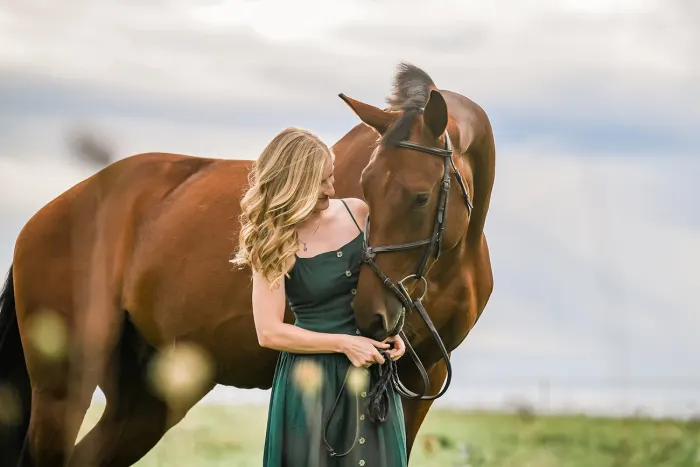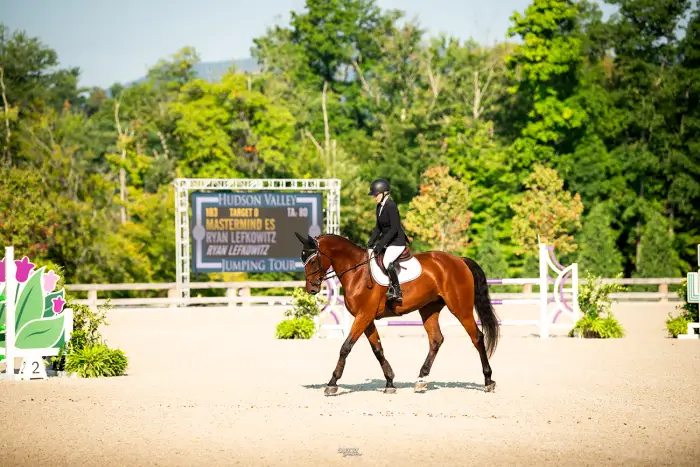The back rail of the oxer presses against my shoulder as I prepare to walk the number of strides in the line. The jumps look smaller while mounted, but on foot they feel imposing. All morning, I have been getting increasingly anxious as I prepare for the move up I had been so excited for. As I tack up for my horse’s first time competing at the new height, I try not to remember mine. But that memory—one of the worst of my riding career—looms large in the back of my mind.
Seventeen years prior, during my last junior year, I asked for too long of a distance to an oxer and crashed through the jump. I remember the dazed confusion I felt after being pulled to my feet, the damp footing soaking through my clothes. I remember lying on my back in an empty stall to catch my breath, feeling thick wetness drain down the back of my throat from my broken nose. I remember not wanting my mother called, because she would panic and then I would have to reassure her I was fine. Luckily, my horse was fine, and I walked in and out of the emergency room with injuries that would heal quickly.
I was devastated to miss the rest of the show. An away, week-long show was a rare gift, not something I could afford to do regularly. The pain of missing out on the rest of the show was worse than the pain from the actual fall. I found out later, as I sat at home in tears, that my then-trainer had told the rest of her clients at the show that she was going to “break my face” for my mistake. The irony, sitting at home with a broken nose and two black eyes, was not lost on me.
I was not surprised; this trainer was well known for her erratic behavior, which seemed to be worse towards me. Although my mother was supportive of and funded my riding, she was largely removed when it came to everything else it entailed. I was expected to be my own advocate when it came to navigating professional relationships within the equestrian industry. Without the shield of a parent to protect me, my then-trainer ranged from curt to bullying toward me. A year prior I had approached her to help me find a lease for the show season. Her response is forever seared into my memory: “I think you need to be more realistic about what your abilities are.”
That was not enough for me. I immediately combed online ads and sent out emails. I found the horse of my dreams within a week—a big, beautiful, chestnut mare with the experience to help me make my debut in the jumper ring. I learned so much from her, including what it felt like to walk into a ring knowing I could win. But more than the confidence of feeling competitive, she gave me confidence in my abilities as a rider. For the very first time, I felt like I was succeeding at this thing I cared so deeply about.

By age 16, I was already used to the feeling of being dismissed by trainers. I was used to this sport hurting. My riding career was being supported by a single mother. Horse ownership was out of the question. The six-month lease on my jumper was the biggest investment we could afford to make in my riding career, and it came at the sunset of my junior years. More typically, I leased a horse for two or three months over the summer, showed at a few local shows, and took once-a-week lessons the rest of the year.
I was a disposable client to my trainers: easy to pick up when I had a horse leased and was showing, and even easier to discard when that lease ended.
ADVERTISEMENT
The first time I really understood was when I was 13 years old. A different barn, different trainer, but the same sinking feeling. My mother and I came home to see a message flashing on the answering machine: “Hi! I just wanted to let you know that we think Ryan would be a better fit in a different lesson going forward. Thanks!” The line beeped. End of message.
My mother had to explain that the trainer only taught people who had horses and went to horse shows, and since my lease had ended, I could not take lessons with her anymore. I ran to my room and cried. I was finally starting to understand that the level of involvement in the sport we could afford meant professionals would not think I was worth investing time in.
Through this lens, other experiences came into focus. There was the time a friend’s mother had asked our trainer if I could ride their horse while they were on vacation, only for the ride to go to a younger, less experienced rider who owned a horse and showed more frequently. There was the schooling show where the judge had us all switch mounts, putting me on a boarder’s new horse. My trainer immediately walked over to me and whispered tersely, almost in warning, that the horse I was on was “very, very nice.” There was the essay I submitted for a writing contest hosted by our local professional horseman’s association. When I asked my trainer what she thought of my submission, she told me it was very good, and that she had hoped it was another student’s essay in case it did win.
There were bright spots. The trainer who let me use her saddle for a summer after I had clearly outgrown my own, and who had an empathetic conversation with my mother about the difficulty of doing this sport on a limited budget. A judge I showed in front of frequently who wrote me a letter of recommendation for the U.S. Hunter Jumper Association’s Emerging Athletes Program. A barn owner who told me he would let my horse take an open trailer spot to a horse show on my birthday, free of charge, as a gift.
Maybe my inability to focus on the kindness of the few over the cruelty of the many reveals something unkind in myself. Either way, these experiences of generosity were made all the more precious by their rarity. They were the exception.
Instead, my junior career was shaped by trainers who looked at me and found me lacking. Lacking in talent or ability. Lacking in funds. Lacking a parent educated enough in the industry to know how to seek out other opportunities for me, or to know when it would have been appropriate to stand up against the things that were being said to me. I loved the horses and the sport. I loved riding more than anything else. But often, I also felt tormented by it. I felt bullied by the adults around me but unsure of my own evaluation of how I was being treated. I constantly struggled with feeling jealous of my peers.
“My junior career was shaped by trainers who looked at me and found me lacking. Lacking in talent or ability. Lacking in funds. … I felt bullied by the adults around me, but unsure of my own evaluation of how I was being treated.”
The single most important lesson any trainer from my junior career taught me was that if you want something, you have to fight and claw for it yourself. In the years since, I have done that. I bought my first horse in college and resold him for a profit. After college, I worked for a grand prix rider I admired as a junior and spent a winter season in Florida working for one of the top equitation trainers in the country. I felt grateful to both individuals, who looked past my lack of robust competition experience and trusted me with riding and caring for some truly incredible animals.
ADVERTISEMENT
I forced my love of the sport and of the animal into hibernation through years of law school and the beginning of my legal career in New York City, always with a long-term goal of having the financial stability to own and compete my own horse. I bided my time until I moved to a more horse-friendly area during the pandemic. Armed with the freedom that comes with having your own income and transportation, I was determined not to end up the client of someone who would make me feel the way I felt as a junior.
I did not have a trainer when I bought my current horse, but I knew I would need help developing him. On the recommendation of a friend, I reached out to a trainer who had a few clients at the boarding barn where I stabled. Over the past three years, my trainer’s calm, methodical approach has been the perfect balance to my stubborn, intense personality. She understands that I come to her with my own experiences, both good and bad.
She stands beside me now as I refocus on the ring in front of me. The horse before me is exiting; it truly is my turn now. I take a deep breath. My trainer looks at me and sees my nervousness. “You’ve got this,” she says. “I would not send you in there if I did not believe you were ready. You can do this. Go have fun.” I nod, give my horse a quick kiss on his neck, and we walk into the ring.
Whatever happens, I get to own and compete the horse my younger self never dreamt big enough to imagine. With him, I am a child on her first pony that never was. In between the shows and lessons and clinics, there are gallops down the grassy lane behind his pasture. There are bites of grass snatched with the bit in his mouth that I pretend not to notice. There are rides spent bareback and bridleless. There are hours sitting in the grass under a warm sun watching him graze. I relish in these moments, soaking in the joy of him and letting it drown out all that came before.

I wish I could tell that young version of me to be a little more grateful; that it hurt her mother, too, to see all the things she could not afford to give her daughter. I wish I could turn her gaze from the girls with more opportunity towards the girls with less, where she would see her own longing echoed in their faces, aimed at what she already has. I wish I could tell her to be a little more patient; that at 33 years old, it feels like there is still so much time ahead of us. I wish I could tell her exactly how good things are going to get. That the tears she shed over every goodbye to a leased horse, or her friends’ social media posts from a show she could not afford to attend, or hurtful word from a trainer, that it would be worth it. But if she knew that, maybe she would get complacent. Maybe she would lose the hunger that drove her, and which led me to the many incredible moments that are in store for her.
“Now entering the ring, Mastermind ES, ridden and owned by Ryan Lefkowitz,” the loudspeaker announces. The Jumbotron flashes my horse’s name, with my name below it twice, once as owner, and once as rider. Owned and ridden. Owner and rider. It is something the child in me will never take for granted. And in that moment I realize: I got here in spite of, and because of, all the trainers who ever doubted me. Their doubt still burns through my veins, lighter fluid on a flame lit long before I ever met them.
I take another breath. I pick up a canter. And we go to the first jump.

Ryan Lefkowitz grew up riding in Westchester County, New York, and rode for the SUNY Geneseo Equestrian Team while in college. After college, she was a working student for Findlay’s Ridge and a barn manager for Spring Ledge LLC before going to law school. She has previously blogged and freelanced for The Chronicle of the Horse. Ryan lives in Rochester, New York, where she works as an attorney, specializing in commercial and civil litigation. She has one horse and a cat named Luna.














